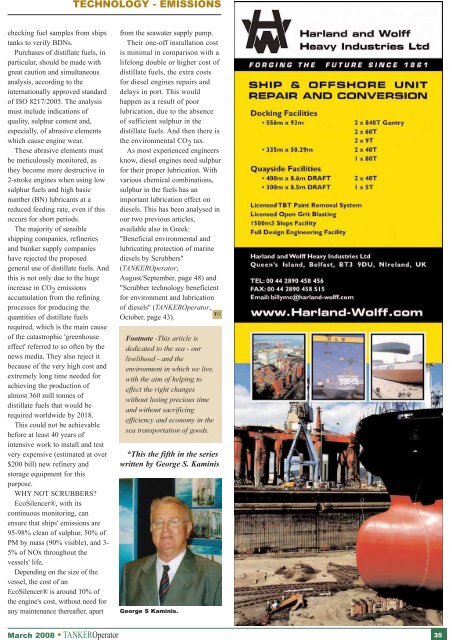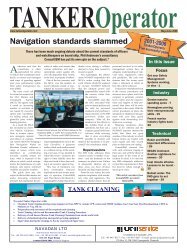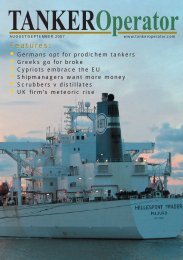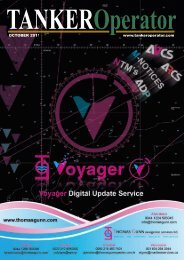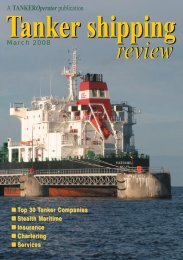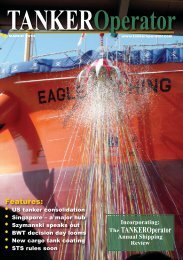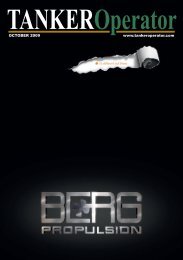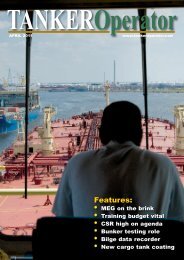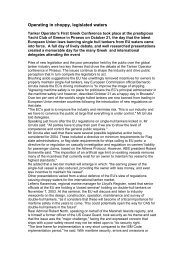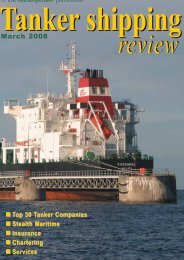Features: Features: - Tanker Operator
Features: Features: - Tanker Operator
Features: Features: - Tanker Operator
Create successful ePaper yourself
Turn your PDF publications into a flip-book with our unique Google optimized e-Paper software.
TECHNOLOGY - EMISSIONS<br />
checking fuel samples from ships<br />
tanks to verify BDNs.<br />
Purchases of distillate fuels, in<br />
particular, should be made with<br />
great caution and simultaneous<br />
analysis, according to the<br />
internationally approved standard<br />
of ISO 8217/2005. The analysis<br />
must include indications of<br />
quality, sulphur content and,<br />
especially, of abrasive elements<br />
which cause engine wear.<br />
These abrasive elements must<br />
be meticulously monitored, as<br />
they become more destructive in<br />
2-stroke engines when using low<br />
sulphur fuels and high basic<br />
number (BN) lubricants at a<br />
reduced feeding rate, even if this<br />
occurs for short periods.<br />
The majority of sensible<br />
shipping companies, refineries<br />
and bunker supply companies<br />
have rejected the proposed<br />
general use of distillate fuels. And<br />
this is not only due to the huge<br />
increase in CO 2 emissions<br />
accumulation from the refining<br />
processes for producing the<br />
quantities of distillate fuels<br />
required, which is the main cause<br />
of the catastrophic 'greenhouse<br />
effect' referred to so often by the<br />
news media. They also reject it<br />
because of the very high cost and<br />
extremely long time needed for<br />
achieving the production of<br />
almost 360 mill tonnes of<br />
distillate fuels that would be<br />
required worldwide by 2018.<br />
This could not be achievable<br />
before at least 40 years of<br />
intensive work to install and test<br />
very expensive (estimated at over<br />
$200 bill) new refinery and<br />
storage equipment for this<br />
purpose.<br />
WHY NOT SCRUBBERS?<br />
EcoSilencer®, with its<br />
continuous monitoring, can<br />
ensure that ships' emissions are<br />
95-98% clean of sulphur, 50% of<br />
PM by mass (90% visible), and 3-<br />
5% of NOx throughout the<br />
vessels' life.<br />
Depending on the size of the<br />
vessel, the cost of an<br />
EcoSilencer® is around 10% of<br />
the engine's cost, without need for<br />
any maintenance thereafter, apart<br />
from the seawater supply pump.<br />
Their one-off installation cost<br />
is minimal in comparison with a<br />
lifelong double or higher cost of<br />
distillate fuels, the extra costs<br />
for diesel engines repairs and<br />
delays in port. This would<br />
happen as a result of poor<br />
lubrication, due to the absence<br />
of sufficient sulphur in the<br />
distillate fuels. And then there is<br />
the environmental CO 2 tax.<br />
As most experienced engineers<br />
know, diesel engines need sulphur<br />
for their proper lubrication. With<br />
various chemical combinations,<br />
sulphur in the fuels has an<br />
important lubrication effect on<br />
diesels. This has been analysed in<br />
our two previous articles,<br />
available also in Greek:<br />
"Beneficial environmental and<br />
lubricating protection of marine<br />
diesels by Scrubbers"<br />
(TANKER<strong>Operator</strong>,<br />
August/September, page 48) and<br />
"Scrubber technology beneficient<br />
for environment and lubrication<br />
of diesels'' (TANKER<strong>Operator</strong>,<br />
TO<br />
October, page 43).<br />
Footnote -This article is<br />
dedicated to the sea - our<br />
livelihood - and the<br />
environment in which we live,<br />
with the aim of helping to<br />
effect the right changes<br />
without losing precious time<br />
and without sacrificing<br />
efficiency and economy in the<br />
sea transportation of goods.<br />
*This the fifth in the series<br />
written by George S. Kaminis<br />
George S Kaminis.<br />
March 2008 TANKER<strong>Operator</strong> 35


